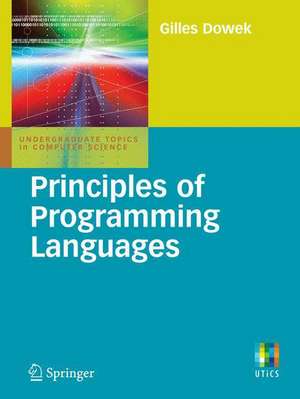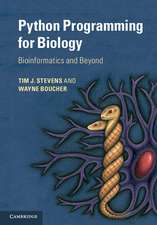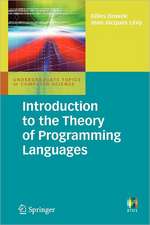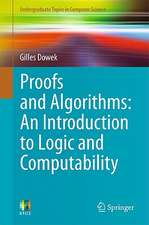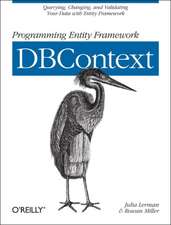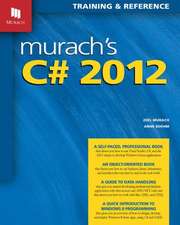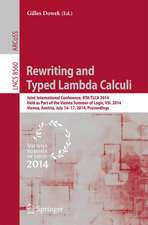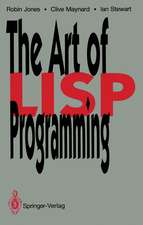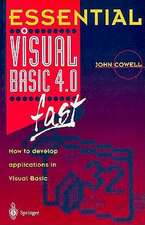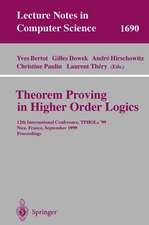Principles of Programming Languages: Undergraduate Topics in Computer Science
Autor Gilles Doweken Limba Engleză Paperback – 13 mar 2009
It is important to realise that knowledge of a single programming language is not really enough. To be a good programmer, you should be familiar with several languages and be able to learn new ones. In order to do this, you’ll need to understand universal concepts, such as functions or cells, which exist in one form or another in all programming languages. The most effective way to understand these universal concepts is to compare two or more languages. In this book, the author has chosen Caml and C.
To understand the principles of programming languages, it is also important to learn how to precisely define the meaning ofa program, and tools for doing so are discussed. Finally, there is coverage of basic algorithms for lists and trees.
Written for students, this book presents what all scientists and engineers should know about programming languages.
Din seria Undergraduate Topics in Computer Science
- 20%
 Preț: 304.13 lei
Preț: 304.13 lei - 20%
 Preț: 233.75 lei
Preț: 233.75 lei - 20%
 Preț: 350.89 lei
Preț: 350.89 lei - 20%
 Preț: 306.58 lei
Preț: 306.58 lei - 20%
 Preț: 187.22 lei
Preț: 187.22 lei - 20%
 Preț: 272.43 lei
Preț: 272.43 lei - 20%
 Preț: 280.93 lei
Preț: 280.93 lei - 20%
 Preț: 245.43 lei
Preț: 245.43 lei - 20%
 Preț: 305.61 lei
Preț: 305.61 lei - 20%
 Preț: 258.79 lei
Preț: 258.79 lei - 20%
 Preț: 376.76 lei
Preț: 376.76 lei - 20%
 Preț: 246.39 lei
Preț: 246.39 lei - 20%
 Preț: 336.99 lei
Preț: 336.99 lei - 20%
 Preț: 341.22 lei
Preț: 341.22 lei - 20%
 Preț: 192.73 lei
Preț: 192.73 lei - 20%
 Preț: 306.72 lei
Preț: 306.72 lei - 20%
 Preț: 384.11 lei
Preț: 384.11 lei - 20%
 Preț: 316.07 lei
Preț: 316.07 lei - 20%
 Preț: 374.37 lei
Preț: 374.37 lei - 20%
 Preț: 225.03 lei
Preț: 225.03 lei - 20%
 Preț: 226.65 lei
Preț: 226.65 lei - 20%
 Preț: 375.54 lei
Preț: 375.54 lei - 20%
 Preț: 395.05 lei
Preț: 395.05 lei - 20%
 Preț: 307.17 lei
Preț: 307.17 lei - 20%
 Preț: 254.37 lei
Preț: 254.37 lei -
 Preț: 334.89 lei
Preț: 334.89 lei - 20%
 Preț: 227.16 lei
Preț: 227.16 lei - 20%
 Preț: 304.37 lei
Preț: 304.37 lei - 20%
 Preț: 316.24 lei
Preț: 316.24 lei - 20%
 Preț: 287.03 lei
Preț: 287.03 lei - 20%
 Preț: 342.46 lei
Preț: 342.46 lei - 20%
 Preț: 276.82 lei
Preț: 276.82 lei - 20%
 Preț: 237.35 lei
Preț: 237.35 lei - 20%
 Preț: 374.20 lei
Preț: 374.20 lei - 20%
 Preț: 304.44 lei
Preț: 304.44 lei - 20%
 Preț: 297.28 lei
Preț: 297.28 lei - 20%
 Preț: 579.37 lei
Preț: 579.37 lei - 20%
 Preț: 298.18 lei
Preț: 298.18 lei - 20%
 Preț: 243.35 lei
Preț: 243.35 lei - 20%
 Preț: 302.80 lei
Preț: 302.80 lei - 20%
 Preț: 297.66 lei
Preț: 297.66 lei - 20%
 Preț: 300.89 lei
Preț: 300.89 lei - 20%
 Preț: 191.36 lei
Preț: 191.36 lei - 20%
 Preț: 278.11 lei
Preț: 278.11 lei - 20%
 Preț: 304.21 lei
Preț: 304.21 lei - 20%
 Preț: 389.96 lei
Preț: 389.96 lei
Preț: 227.81 lei
Preț vechi: 284.76 lei
-20% Nou
Puncte Express: 342
Preț estimativ în valută:
43.59€ • 46.61$ • 36.35£
43.59€ • 46.61$ • 36.35£
Carte tipărită la comandă
Livrare economică 17 aprilie-01 mai
Preluare comenzi: 021 569.72.76
Specificații
ISBN-13: 9781848820319
ISBN-10: 1848820313
Pagini: 172
Ilustrații: XII, 159 p.
Dimensiuni: 170 x 244 x 9 mm
Greutate: 0.32 kg
Ediția:2009
Editura: SPRINGER LONDON
Colecția Springer
Seria Undergraduate Topics in Computer Science
Locul publicării:London, United Kingdom
ISBN-10: 1848820313
Pagini: 172
Ilustrații: XII, 159 p.
Dimensiuni: 170 x 244 x 9 mm
Greutate: 0.32 kg
Ediția:2009
Editura: SPRINGER LONDON
Colecția Springer
Seria Undergraduate Topics in Computer Science
Locul publicării:London, United Kingdom
Public țintă
Lower undergraduateCuprins
Imperactive Core.- Functions.- Exceptions.- Programming with Trees.- Objects.- Recursion.- Dynamic Data Types.- Programing with Lists.- Records
Recenzii
From the reviews:
"The primary programming language topics covered are basic imperative constructs, functions, semantics, recursion, data types, exceptions, and objects. It is clear and easy to read, with nice exercises … . it is written at a good level for undergraduate students." (M. D. Derk, ACM Computing Reviews, June, 2009)
“As stated in the title, this book focuses on the principles of programming languages. … Numerous exercises are included, ranging from simplistic to relatively complex. … This book would be of most help to those who already know exactly what they are looking for and would like to see an example of that construct. Summing Up: Recommended. Graduate students through professionals/practitioners.” (M. B. DuBois, Choice, Vol. 47 (6), February, 2010)
"The primary programming language topics covered are basic imperative constructs, functions, semantics, recursion, data types, exceptions, and objects. It is clear and easy to read, with nice exercises … . it is written at a good level for undergraduate students." (M. D. Derk, ACM Computing Reviews, June, 2009)
“As stated in the title, this book focuses on the principles of programming languages. … Numerous exercises are included, ranging from simplistic to relatively complex. … This book would be of most help to those who already know exactly what they are looking for and would like to see an example of that construct. Summing Up: Recommended. Graduate students through professionals/practitioners.” (M. B. DuBois, Choice, Vol. 47 (6), February, 2010)
Textul de pe ultima copertă
The development of programming languages has profoundly impacted our relationship with language, complexity and machines. By introducing the principles of programming languages, using the Java language as a support, Gilles Dowek provides the necessary fundamentals of this language as a first objective.
It is important to realise that knowledge of a single programming language is not really enough. To be a good programmer, you should be familiar with several languages and be able to learn new ones. In order to do this, you’ll need to understand universal concepts, such as functions or cells, which exist in one form or another in all programming languages. The most effective way to understand these universal concepts is to compare two or more languages. In this book, the author has chosen Caml and C.
To understand the principles of programming languages, it is also important to learn how to precisely define the meaning of a program, and tools for doing so are discussed. Finally, there is coverage of basic algorithms for lists and trees.
Intended for students with some small experience of computer programming, learned empirically in a single programming language other than Java, students in both computer science and engineering will find this book a very welcome introduction to the principles of programming languages.
Written for students this book presents what all scientists and engineers should know about programming languages.
It is important to realise that knowledge of a single programming language is not really enough. To be a good programmer, you should be familiar with several languages and be able to learn new ones. In order to do this, you’ll need to understand universal concepts, such as functions or cells, which exist in one form or another in all programming languages. The most effective way to understand these universal concepts is to compare two or more languages. In this book, the author has chosen Caml and C.
To understand the principles of programming languages, it is also important to learn how to precisely define the meaning of a program, and tools for doing so are discussed. Finally, there is coverage of basic algorithms for lists and trees.
Intended for students with some small experience of computer programming, learned empirically in a single programming language other than Java, students in both computer science and engineering will find this book a very welcome introduction to the principles of programming languages.
Written for students this book presents what all scientists and engineers should know about programming languages.
Caracteristici
Presents the concepts of programming languages, to enable students to use more than one language Includes supplementary material: sn.pub/extras
